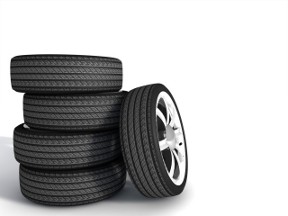Did you know that the condition of your tire can tell you a lot about your car? We can learn quite a bit about our vehicles by the way our tires wear. Tire condition is determined by the wear patterns. Abnormal wear patterns can often alert us to the need for simple tire maintenance or the need for a front-end alignment. Being aware of these patterns and how to interpret them can help you lengthen the life of your tires and improve the overall performance of your vehicle. Below is a list of common tire wear patterns and what they might indicate.
 Condition: A tread cut or puncture is caused when a foreign object penetrates the tread area. This can lead to air loss or possible tire destruction.
Condition: A tread cut or puncture is caused when a foreign object penetrates the tread area. This can lead to air loss or possible tire destruction.
Solution: If a puncture occurs, have the damage repaired if possible. Your service technician can determine if the puncture can be repaired.
Condition: Wear on one side of a tire can be a sign of misalignment or worn parts. This condition will shorten the life of the tire and may lead to other tire damage.
Solution: Have the vehicle inspected for possible mechanical or suspension problems that should be repaired.
Condition: Shoulder wear on both sides of a tire. This happens when the tire is under-inflated and the outer shoulders are forced to carry most of the weight. This will lead to extreme shoulder wear and shorten the life of the tire.
Solution: Keep the tires inflated to manufacturer’s recommended level.
Condition: Center tread wear. This type of damage can be caused by over-inflation. The center of the tread will bulge outward, forcing the majority of the weight to be carried in the center of the tire which causes premature wear.
Solution: Maintain the vehicle manufacturer’s recommended inflation level. These are usually found inside the driver’s side door jamb.
Good driving habits and preventative maintenance, which includes proper air pressure, tire balance, alignment and rotation can add miles to the life of your tires as well as safety for you and your family. If we can help you with any of these or other auto repair needs, call us at (303) 691-2760 or stop by our shop.

Leave a Reply
You must be logged in to post a comment.